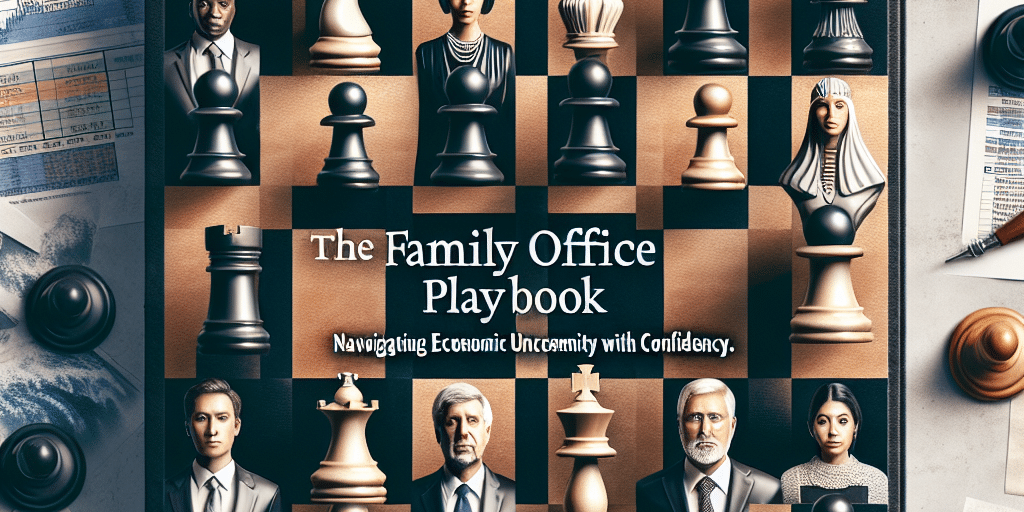In an ever-changing global landscape marked by economic uncertainty, geopolitical tensions, and technological advancements, family offices are increasingly finding themselves at a crossroads. As custodians of generational wealth, these entities must not only preserve but also grow their assets while safeguarding their legacies for future generations. Navigating economic uncertainty has emerged as a cornerstone of effective family office management, leading to the development of comprehensive strategies detailed in “The Family Office Playbook.”
Understanding the Family Office Landscape
Family offices are private wealth management entities established by high-net-worth families to manage their investments and financial needs. They offer a range of services, from investment management to financial planning, tax optimization, and philanthropic guidance. The global rise of family offices has coincided with increasing market volatility, compelling them to adopt proactive measures to safeguard their assets against potential downturns.
Key Challenges in Economic Uncertainty
Market Volatility: Fluctuating markets can diminish asset values and complicate investment strategies. Family offices must be prepared to respond quickly and effectively to market changes.
Inflation Pressures: Rising inflation can erode purchasing power, making it essential for family offices to adopt inflation-hedging strategies within their portfolios.
Geopolitical Risks: Political instability, trade wars, and regulatory changes can impact various investment sectors, necessitating a keen awareness of global dynamics.
- Technological Disruption: Rapid advancements in technology can disrupt traditional business models, leading family offices to reconsider their investment strategies, especially in sectors vulnerable to disruption, like retail and transportation.
The Strategy: Building a Resilient Family Office
1. Diversification and Asset Allocation
One of the most effective strategies for mitigating risk in times of uncertainty is diversification. A well-structured portfolio that includes a mix of asset classes—such as equities, fixed income, real estate, private equity, and hedge funds—can help cushion against losses. Family offices are increasingly looking beyond traditional investments, exploring alternative assets such as cryptocurrencies, timberland, and commodities, which can provide uncorrelated returns in volatile markets.
2. Risk Management Framework
Implementing a robust risk management framework is essential. Family offices should regularly assess their risk exposure and adjust their strategies accordingly. Utilizing tools like stress testing and scenario analysis can help identify vulnerabilities and prepare for potential downturns. Engaging with professional risk management consultants can also provide insights into best practices tailored for the family’s unique circumstances.
3. Emphasizing Financial Literacy
Family offices that prioritize financial education for family members are likely to make better investment decisions. By fostering a culture of financial literacy, family members—the stewards of wealth—can understand the implications of their financial choices and contribute to sound decision-making. Educational programs should cover topics like investment strategies, market analysis, and the importance of long-term planning.
4. Strategic Partnerships
Collaborating with experts, including financial advisors, investment managers, and legal consultants, can enhance the family office’s ability to navigate economic challenges. These partnerships provide access to a wealth of knowledge, cutting-edge research, and innovative financial products, enabling family offices to stay ahead of the curve.
5. Philanthropy and ESG Investments
Incorporating philanthropy and ESG (Environmental, Social, and Governance) principles into the investment strategy can not only fulfill a family’s mission but also yield sustainable returns. Conscious investing aligns with values, attracts passionate stakeholders, and positions the family office as a forward-thinking entity. During uncertain times, demonstrating social responsibility can strengthen a family’s legacy and enhance its reputation in the community.
6. Long-Term Perspective
The most successful family offices take a long-term view of their investments, understanding that markets fluctuate and drawing lessons from historical data. Maintaining this perspective allows them to weather short-term volatility without making reactive decisions that could jeopardize their long-term goals.
Conclusion: Securing the Future with Confidence
As economic uncertainty continues to be a defining characteristic of today’s financial landscape, family offices that adopt a comprehensive playbook will navigate these challenges more effectively. By embracing principles of diversification, risk management, financial education, strategic partnerships, and social responsibility, family offices can preserve their wealth and secure their legacies. In doing so, they not only safeguard their family’s future but also contribute positively to society, setting a benchmark for responsible stewardship of wealth in an unpredictable world.
In the face of economic uncertainty, confidence is not merely about being prepared—it’s about being proactive, informed, and resilient. The Family Office Playbook is not just a guide; it’s a roadmap to navigating the rocky terrain of our times with assurance and clarity.











